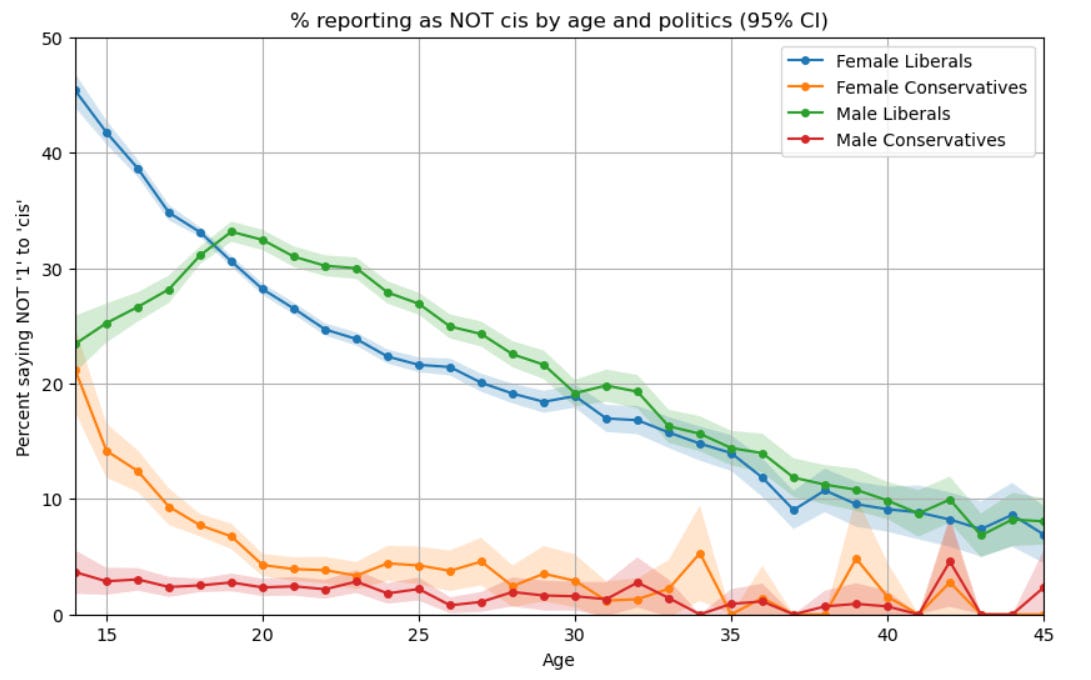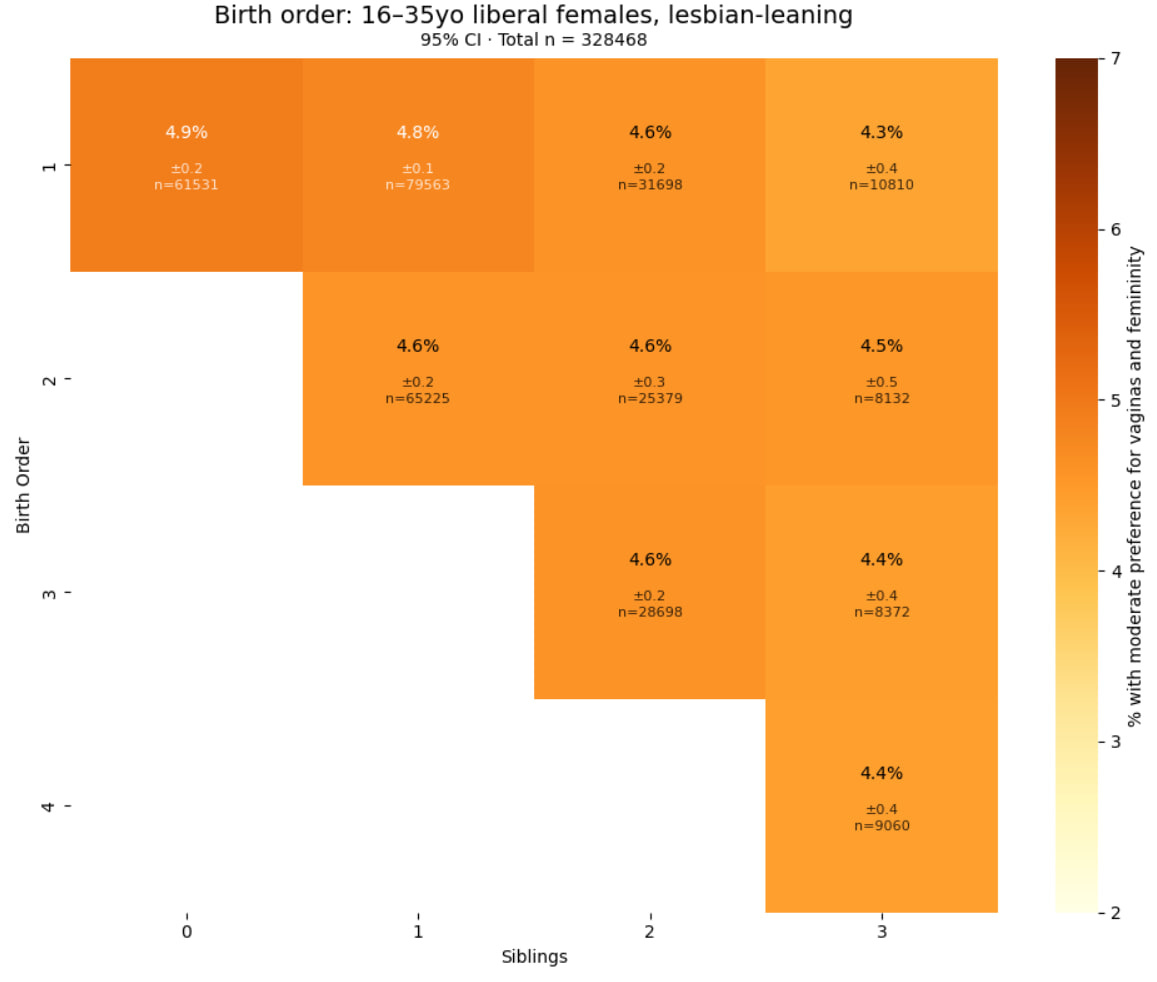Some people fight over whether birth order predicts gayness. According to my data, it obviously does
If you’re not familiar, I’m using data from my Big Kink Survey, which is a long, extremely detailed survey I built that went viral on tiktok, and then a bunch of corners of the internet, and at this point is #1 if you google ‘kink survey’. Around 2.4 million people have opened it, and people have finished it ~900k times, and around ~770k people pass my general sanity-check cleaning filters. It’s very popular among young women and liberals, but even my conservative male sample size dwarfs most published studies in the field of sex research.
For simplicity, I’m not controlling for anything, but nothing I checked had meaningful potential to confound the data. Conservatives have more siblings (very conservative people reported 0.3 more siblings than very liberal people did), but filtering for liberal vs conservative didn’t change the outcomes noticeably at all.
You might notice the gay rates are real high. This is partially cause liberal people are gayer (and the majority of my data), but also I suspect cause I had a slightly broader definition of gay (details later).
Some people argue over whether the gender of siblings predicts how gay men will be. I asked people if they had mostly male or mostly female siblings, or an equal split of both. If I just look at the groups of ‘mostly male’ and ‘mostly female’ siblings, This seems a little bit true
Having older female siblings seems to predict gayness meaningfully more than having older male siblings! This is surprising enough that I doublechecked my code to make sure I hadn’t accidentally swapped the sign. Most studies seem to find the opposite. I don’t know what’s going on here.
…I was actually planning to write this blog post with a whole host of data, I’ve got a bunch of charts I was gonna throw at you, but this is actually way more confusing and interesting. It seems pretty well established in science that older brothers are correlated with being gay, and this doesn’t hold for older sisters.
Is it somehow related to the fact that more males said they had brothers than sisters? Maybe but probably not - of people who said their siblings were mostly one gender, 51.6% picked male and 48.4% picked female. This is a gap that seems pretty explainable by the fact that more males are born than females; when I mess around with some simulations the gap seems consistent with this.
Is it how I define ‘gay’?
In the survey, I asked people whether they preferred vaginas or penises, and also whether they preferred masculinity or femininity. This was how males responded:
To count as gayish, I took the top right four boxes. I don’t really see how this could be responsible for the mysterious older sister phenomenon here.
But let’s check the full-gay category just in case:
siblings mostly male
birthorder supergay% n ci
1.0 1.4 38643 0.1
2.0 1.9 31760 0.2
3.0 2.1 8773 0.3
4.0 2.1 2892 0.5 siblings mostly female
birthorder supergay% n ci
1.0 1.3 36861 0.1
2.0 1.9 30202 0.2
3.0 2.3 7543 0.3
4.0 2.9 2209 0.7Males with mostly-male siblings saw a birth order jump 0.7, while mostly-female had a jump of 1.6%. The confidence is lower because the sample is lower, but so far the effect in my data still holds among the supergays.
I am so confused. Age doesn’t seem to have an impact on this either, there’s a similar gap whether I check younger or older males.
What about the ‘mostly’ in the ‘are your siblings mostly male or female’? I don’t ask specific number! But in this sample, people have either 1, 2, or 3 siblings; the only way you could have a female sibling in ‘mostly male’ is in the 3-sibling category, and this would be one female and two males. This means out of all possible siblings reported, we should expect around 4.5/5 of them to be male. I don’t think this method of structuring the survey question should cause that much of a deviation in results.
Wikipedia says:
“the odds of having a homosexual son increase from approximately 2% for the first born son, to 3% for the second, 5% for the third and so on.”…
“The fraternal birth order effect has been described by one of its proponents as "the most consistent biodemographic correlate of sexual orientation in men”
Probably I am wrong here. By default I am likely wrong, because it’s very unlikely that we would see a whole host of studies and meta-analyses finding no effect with female siblings if there is in fact an effect with female siblings.
Again, I really don’t think anything is going wrong in my data processing. I’ve quadruple checked I wasn’t redefining anything or swapping signs. I checked the base raw data before I did any cleaning at all to make sure I wasn’t accidentally cleaning something weird, and it all holds pre-cleaning.
Maybe I’m failing to control for something important? But I checked birth order along with a whole bunch of other stuff in my data, and nothing seemed like a good candidate besides politics.
For what it’s worth I find almost no effect among females:
I don’t have time to do an in-depth review of all the available research, but some of it does look pretty good. Like, there’s a 9-million sample size analysis of birth order and sibling gender and whether or not people entered into a same-sex marriage, and it finds that
the probability for individuals [of same sex union] with one older brother was 12.5% higher than that for individuals with one older sister.
So, ???
It seems unlikely that the other surveys are wrong and I’m somehow right. My current top guess is that the difference lies in how we’re measuring homosexuality; the 9mil survey looks at legally recognized union, while I’m asking about what are u into? Maybe something about legally recognized unions are doing some other filtering, like this requires a level of boldness that people with older brothers are more likely to have? Or in my data men with older sisters are more likely to enjoy identifying as gay because they’re in a family that celebrates more sexual-minority type identification?
Actually… I wonder if this is part of it. Women are much more liberal than men are, and we know liberalism is correlated strongly with identifying as non-cis

So maybe men raised with a lot of older sisters get disproportionately exposed to liberal, non-cis values, and are more likely to emphasize their interest in men as a signaling thing? But they wouldn’t go so far as to marry a man, and if you’re only tracking legal union then all these men suddenly drop out of the data?
Wait… are men with more older sisters, more liberal? Let’s check my socialliberal question, where people rated themselves from socially conservative to liberal on a -3 to 3 scale. Here’s the means:
Gah!
No, my theory predicts that we should see increased liberal identification with more older sisters - at least compared to brothers - but there’s basically no noticeable change.
Man, I have no idea. I’m so confused. Are we just seeing “if you run enough checks on data, eventually you’ll accidentally see a rare thing outside of your expected confidence interval”? Is this just a random fluke in my data? I’m not sure how to easily check how unlikely this is in this specific circumstance, but feeding the raw data to o3 gives me a p ≈ 1.7 × 10⁻¹⁰, or ≈ 1 chance in 6 billion, that I would see this outcome in a world where there was actually the same birth order slope for males and females.
If the answer lies in my failure to control for something, then that in itself would be crazy. If the fraternal birth order effect only applies to people in some areas of the world, or of some ages, or of some political orientations, that would be really bizarre.
…Probably the answer is something really simple and obvious and I will feel very dumb when someone kindly points it out for me. But I’d love to get it pointed out!
When I have more time later I’ll try uploading the raw data to my raw data directory so other people can replicate what I’m finding.











So as I understand it, the fraternal birth order (FBOE) is not linked to just any kind of gay but is specifically linked to the kind of gay that goes hand in hand with effeminacy. The most extreme expression of this kind of gay is called ‘homosexual transsexualism,’ which is when gay men are so effeminate and cross-sex shifted that they get clinical gender dysphoria and medicalize into transgender women. But homosexual transsexuals are not the only gay men with a cross-sex shift. There are gay men who have a lesser degree of it or the same degree of it but just don’t transition for x, y or z reasons. All this to say that the FBOE is more accurately and specifically described as a non-genetic but inborn phenomenon that causes cross-sex shift in males. The downstream effect is male androphilia/homosexuality but because male effeminacy/gender-nonconformity shows up before puberty in FBOE-affected males and is what leads some of them to become gender-dysphoric, I think it’s more helpful to talk about FBOE as causing cross-sex shift in male neuronanatomy. I know this might not have answered all your questions. I’m not good at finer stats so avoided those questions but hope this helps anyway.
Having never heard of the sibling order to gayness idea before, to me it's just blindingly obvious that older sisters will make you more gay than older brothers. If you're an 11-year-old boy with a bunch of older sisters, you never get to be the man of the house, your environment is filled with pouty gossip, carefree prancing and reflexive social performance - of course you'll give in a little. The presence of older brothers only gives you the "bottomness" without the additional feminine social elements. Being an autistic only child and beaten-down class clown, bottom of the totem pole, I did have a brief phase of sharp, lip-bitey taunting in the classroom, partially self-defensive. I kept it subtle, but present. I remember identifying a little bit with Summer Glau's over-the-top kpop pose with a sword on the Serenity DVD cover. I can very easily mentally plot out another life where that mode of social-sexual interface could get locked into place for me. Boys are more feminine than men, obviously, so they're able to dip into that fresh-faced flirtatious mode.